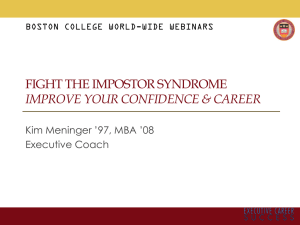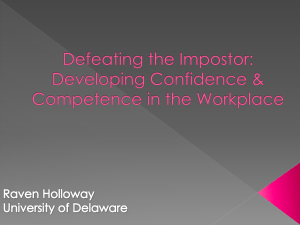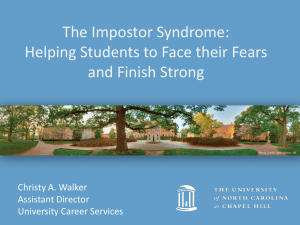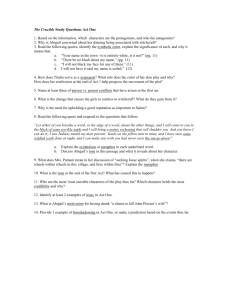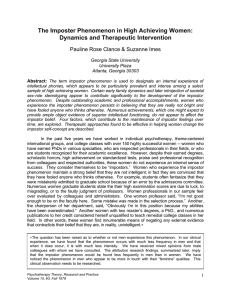No, You're Not an Impostor - Science Careers
advertisement
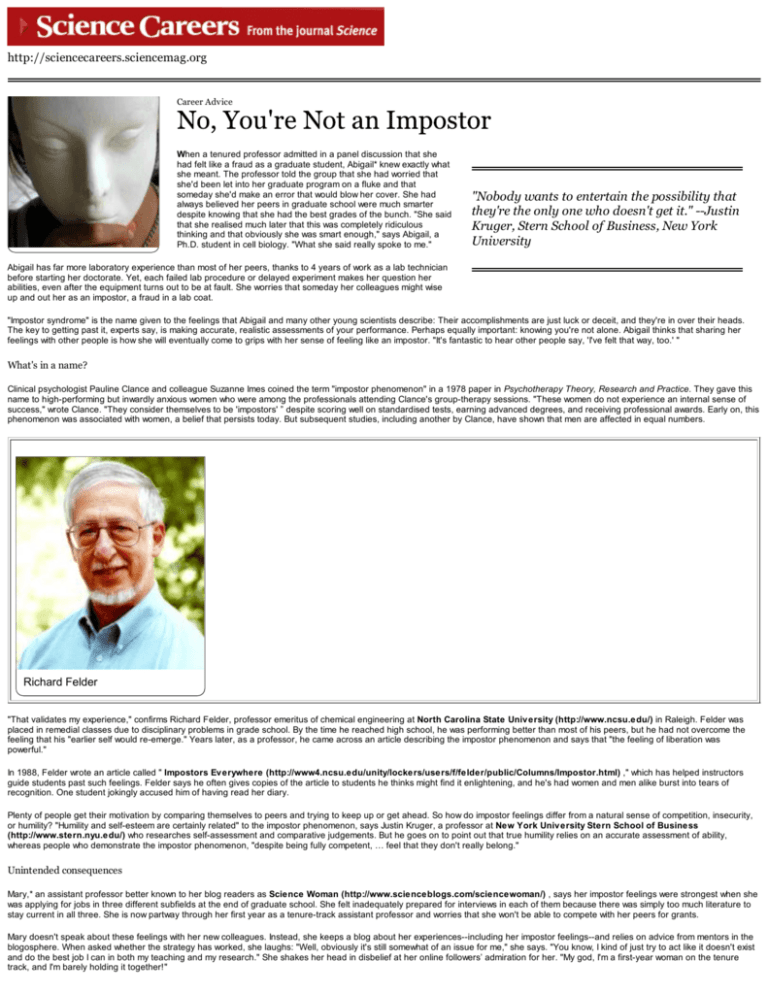
http://sciencecareers.sciencemag.org Career Advice When a tenured professor admitted in a panel discussion that she had felt like a fraud as a graduate student, Abigail* knew exactly what she meant. The professor told the group that she had worried that she'd been let into her graduate program on a fluke and that someday she'd make an error that would blow her cover. She had always believed her peers in graduate school were much smarter despite knowing that she had the best grades of the bunch. "She said that she realised much later that this was completely ridiculous thinking and that obviously she was smart enough," says Abigail, a Ph.D. student in cell biology. "What she said really spoke to me." "Nobody wants to entertain the possibility that they're the only one who doesn't get it." --Justin Kruger, Stern School of Business, New York University Abigail has far more laboratory experience than most of her peers, thanks to 4 years of work as a lab technician before starting her doctorate. Yet, each failed lab procedure or delayed experiment makes her question her abilities, even after the equipment turns out to be at fault. She worries that someday her colleagues might wise up and out her as an impostor, a fraud in a lab coat. "Impostor syndrome" is the name given to the feelings that Abigail and many other young scientists describe: Their accomplishments are just luck or deceit, and they're in over their heads. The key to getting past it, experts say, is making accurate, realistic assessments of your performance. Perhaps equally important: knowing you're not alone. Abigail thinks that sharing her feelings with other people is how she will eventually come to grips with her sense of feeling like an impostor. "It's fantastic to hear other people say, 'I've felt that way, too.' " What's in a name? Clinical psychologist Pauline Clance and colleague Suzanne Imes coined the term "impostor phenomenon" in a 1978 paper in Psychotherapy Theory, Research and Practice. They gave this name to high-performing but inwardly anxious women who were among the professionals attending Clance's group-therapy sessions. "These women do not experience an internal sense of success," wrote Clance. "They consider themselves to be 'impostors' ” despite scoring well on standardised tests, earning advanced degrees, and receiving professional awards. Early on, this phenomenon was associated with women, a belief that persists today. But subsequent studies, including another by Clance, have shown that men are affected in equal numbers. Richard Felder "That validates my experience," confirms Richard Felder, professor emeritus of chemical engineering at North Carolina State University (http://www.ncsu.edu/) in Raleigh. Felder was placed in remedial classes due to disciplinary problems in grade school. By the time he reached high school, he was performing better than most of his peers, but he had not overcome the feeling that his "earlier self would re-emerge." Years later, as a professor, he came across an article describing the impostor phenomenon and says that "the feeling of liberation was powerful." In 1988, Felder wrote an article called " Impostors Everywhere (http://www4.ncsu.edu/unity/lockers/users/f/felder/public/Columns/Impostor.html) ," which has helped instructors guide students past such feelings. Felder says he often gives copies of the article to students he thinks might find it enlightening, and he's had women and men alike burst into tears of recognition. One student jokingly accused him of having read her diary. Plenty of people get their motivation by comparing themselves to peers and trying to keep up or get ahead. So how do impostor feelings differ from a natural sense of competition, insecurity, or humility? "Humility and self-esteem are certainly related" to the impostor phenomenon, says Justin Kruger, a professor at New York University Stern School of Business (http://www.stern.nyu.edu/) who researches self-assessment and comparative judgements. But he goes on to point out that true humility relies on an accurate assessment of ability, whereas people who demonstrate the impostor phenomenon, "despite being fully competent, … feel that they don't really belong." Unintended consequences Mary,* an assistant professor better known to her blog readers as Science Woman (http://www.scienceblogs.com/sciencewoman/) , says her impostor feelings were strongest when she was applying for jobs in three different subfields at the end of graduate school. She felt inadequately prepared for interviews in each of them because there was simply too much literature to stay current in all three. She is now partway through her first year as a tenure-track assistant professor and worries that she won't be able to compete with her peers for grants. Mary doesn't speak about these feelings with her new colleagues. Instead, she keeps a blog about her experiences--including her impostor feelings--and relies on advice from mentors in the blogosphere. When asked whether the strategy has worked, she laughs: "Well, obviously it's still somewhat of an issue for me," she says. "You know, I kind of just try to act like it doesn't exist and do the best job I can in both my teaching and my research." She shakes her head in disbelief at her online followers’ admiration for her. "My god, I'm a first-year woman on the tenure track, and I'm barely holding it together!" Valerie Young It is probably normal to experience impostor feelings to some degree in an unfamiliar environment, says career counsellor Valerie Young. "If there is some new transitional experience, new career, new promotion, it can trigger those feelings." Impostors have trouble putting those feelings in perspective and worry about their errors, not recognising that their colleagues make them, too. They also attribute their successes to luck or other factors beyond their control, while attributing the successes of their peers to skill. Young says the root of the problem appears to be "very unrealistic notions of what it means to be competent" and says that people "set this internal bar exceedingly high." When they occasionally fail, these people may adopt negative behaviours such as procrastination and perfectionism. Mary says that her impostor feelings "maybe slightly held me back, particularly in terms of getting things written up and submitted. … I'm never sure whether it's good enough, so maybe I hang onto things longer than colleagues." But when asked, she concedes that she doesn't know how much time her colleagues spend on their work--an example of setting goals based on an incomplete understanding of her competition. "Impostors" may also be less willing to present their work for evaluation, fearing that every time they do, they are at risk of being exposed. "Why apply for a position you secretly believe you are not qualified for?" asks Abigail. Solutions: Impostors love company Rugged individualists get past their impostor feelings by getting on with their job. But for others, breaking the issue down into manageable steps may be helpful. Justin Kruger For many "impostors," a disjunction exists between their self-assessment and their actual abilities. Young encourages her clients to recognise that feeling incompetent and being incompetent are two different things. "People aren't very accurate at identifying how well or how poorly they're doing," says social psychology professor David Dunning of Cornell University (http://www.cornell.edu/) . But accuracy in self-assessment can mean the difference between gracefully carrying on after an unusually poor performance and skulking away from future challenges. Another strategy, which Clance wrote about in her 1978 article, is to keep track of compliments you receive and focus on accepting rather than blowing off praise. Abigail developed a related approach for disowning her failures: She kept a list of all the times when she blamed herself for lab setbacks that turned out to be out of her control. "Eventually," she says, "the evidence piles up to the point where you have to look it in the eye and say, 'You know, it's not me!' " A particularly effective tactic is talking to other people. "We can't peer into the minds of others and see that, 'Wait a minute, everyone else is also just as mystified!' " says Kruger, so people need to make the effort to discuss their performance with their peers. When you discover that the people you admire (or fear) sometimes worry about their own achievements, it can give you perspective on your own anxieties." As Kruger puts it, "nobody wants to entertain the possibility that they're the only one who doesn't get it." Of course, it's easy to say that you should talk to peers and advisers but much harder to do. It can be awkward to admit to advisers that you worry that you're unqualified for the job. "Your worst fear would be for them to say, 'You know, I've been thinking that, too!' " says Abigail. Instead, both Abigail (known on her blog as Mrs. Whatsit (http://ilovesciencereally.wordpress.com/) ) and Mary have reached out to other young scientists via their personal blogs, which afford them a level of anonymity but still help them air out their worries and seek support from their readers. Impostor feelings have a way of festering silently for a long time, thanks to the difficulty of accurate self-assessment and the social stigma of asking for help. Connecting with peers anonymously can be a first step toward realising that great scientists are made, not born, and that even some of the best of them faced on-the-job doubts along the way. * Names have been changed. Lucas Laursen is a science writer based in Cambridge, U.K. Comments, suggestions? Please send your feedback to our editor (mailto:snweditor@aaas.org) . Photos. Top, credit: Xenia Antunes. Middle, bottom: courtesy of the subjects. DOI: 10.1126/science.caredit.a0800025 Cancel
